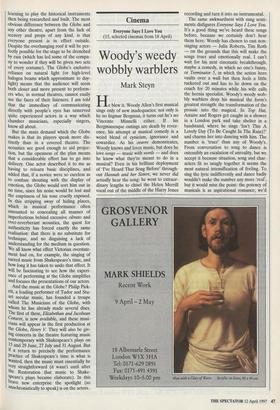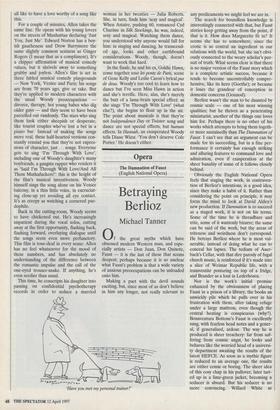Cinema
Everyone Says I Love You (15, selected cinemas from 18 April)
Woody's weedy wobbly warblers
Mark Steyn
He blew it. Woody Allen's first musical sings only of new inadequacies: not only is he no Ingmar Bergman, it turns out he's no Vincente Minnelli either. If his Bergmanesque outings are death by rever- ence, his attempt at musical comedy is a weird blend of cynicism, ignorance and cowardice. As his oeuvre demonstrates, Woody knows and loves music, but does he love songs — music with words — and does he know what they're meant to do in a musical? Even in his brilliant deployment of 'I've Heard That Song Before' through- out Hannah and her Sisters, we never did actually hear the song: he went to extraor- dinary lengths to chisel the Helen Merrill vocal out of the middle of the Harry Jones recording and turn it into an instrumental.
The same awkwardness with sung senti- ments disfigures Everyone Says I Love You. It's a good thing we've heard these songs before, because we certainly don't hear them here: Woody has chosen to cast non- singing actors — Julia Roberts, Tim Roth — on the grounds that this will make the songs truer and emotionally real. I can't wait for his next cinematic breakthrough; maybe a comedy, in which no one's funny, or Terminator 5, in which the action hero vaults over a wall but then feels a little tuckered out and has to lie down on the couch for 20 minutes while his wife calls the hernia specialist. Woody's weedy wob- bly warblers deny his musical the form's greatest strength: the transformation of the prosaic into the magical. In Top Hat, Astaire and Rogers get caught in a shower in a London park and take shelter in a bandstand, where he sings 'Isn't This A Lovely Day (To Be Caught In The Rain)?' and charms her into dancing with him. The number is 'truer' than any of Woody's. From conversation to song to dance is ostensibly an escalation of unreality, but we accept it because situation, song and char- acters fit so snugly together it seems the most natural intensification of feeling. To sing the lyric indifferently and dance badly wouldn't make the number any more 'real', but it would miss the point: the potency of musicals is as aspirational romance; we'd all like to have a love worthy of a song like this.
For a couple of minutes, Allen takes the same line. He opens with his young lovers on the streets of Manhattan declaring 'Just You, Just Me'. Edward Norton has a boy- ish gaucheness and Drew Banymore the same slightly common sexiness as Ginger Rogers (I mean that as a compliment). It's a chipper affirmation of musical comedy values, but it shrivels away to something grubby and joyless. Allen's film is set in three fabled musical comedy playgrounds — New York, Venice and Paris; his songs are from 70 years ago, give or take. But they're applied to modern characters with the usual Woody preoccupations — divorce, therapy, hot young babes who dig older guys — and they seem to have been parcelled out randomly. The stars who sing them look either sheepish or desperate, like tourist couples who've lost a bet in a piano bar. Instead of making the songs more real, these half-hearted versions con- stantly remind you that they're not expres- sions of character, just. .. songs. Everyone gets to sing 'I'm Through With Love', including one of Woody's daughter's many boyfriends, a gangsta rapper who renders it as 'Said I'm Through With Love/And All Them Muthafuckers!': this is the height of the film's musical inventiveness. Woody himself sings the song alone on his Venice balcony, in a thin little voice, in excruciat- ing close-up yet avoiding all eye contact. It's as creepy as watching a cornered pae- dophile.
Back in the cutting-room, Woody seems to have chickened out. He's increasingly impatient during the vocal solos, cutting away at the first opportunity, flashing back, flashing forward, overlaying dialogue until the songs seem even more perfunctory. This film is tone-deaf in every sense: Allen has no feel whatsoever for the mood of these numbers, and has absolutely no understanding of the difference between the romantic impulse and the call of the one-eyed trouser-snake. If anything, he's even seedier than usual.
This time, he conscripts his daughter into passing on confidential psychotherapy records in order to seduce a married woman in her twenties — Julia Roberts. She, in turn, finds him 'sexy and magical'. When Astaire, pushing 60, romanced Cyd Charisse in Silk Stockings, he was, indeed, sexy and magical. Watching them dance, you understood why anyone would fall for him: in singing and dancing, he transcend- ed age, looks and other earthbound considerations. Woody, though, doesn't want to work that hard.
In the finale, he and his ex, Goldie Hawn, come together sous les ponts de Paris, scene of Gene Kelly and Leslie Caron's lyrical pas de dewc. Woody's too cool to learn how to dance but I've seen Miss Hawn in action and she's terrific. Here, alas, she's merely the butt of a lame-brain special effect: as she sings 'I'm Through With Love' (what else?), she begins to float up in the air. The point about musicals is that they're not Independence Day or Twister. song and dance are not special effects, but human effects. In Hannah, an exasperated Woody tells Diane Wiest. 'You don't deserve Cole Porter.' He doesn't either.



































































 Previous page
Previous page